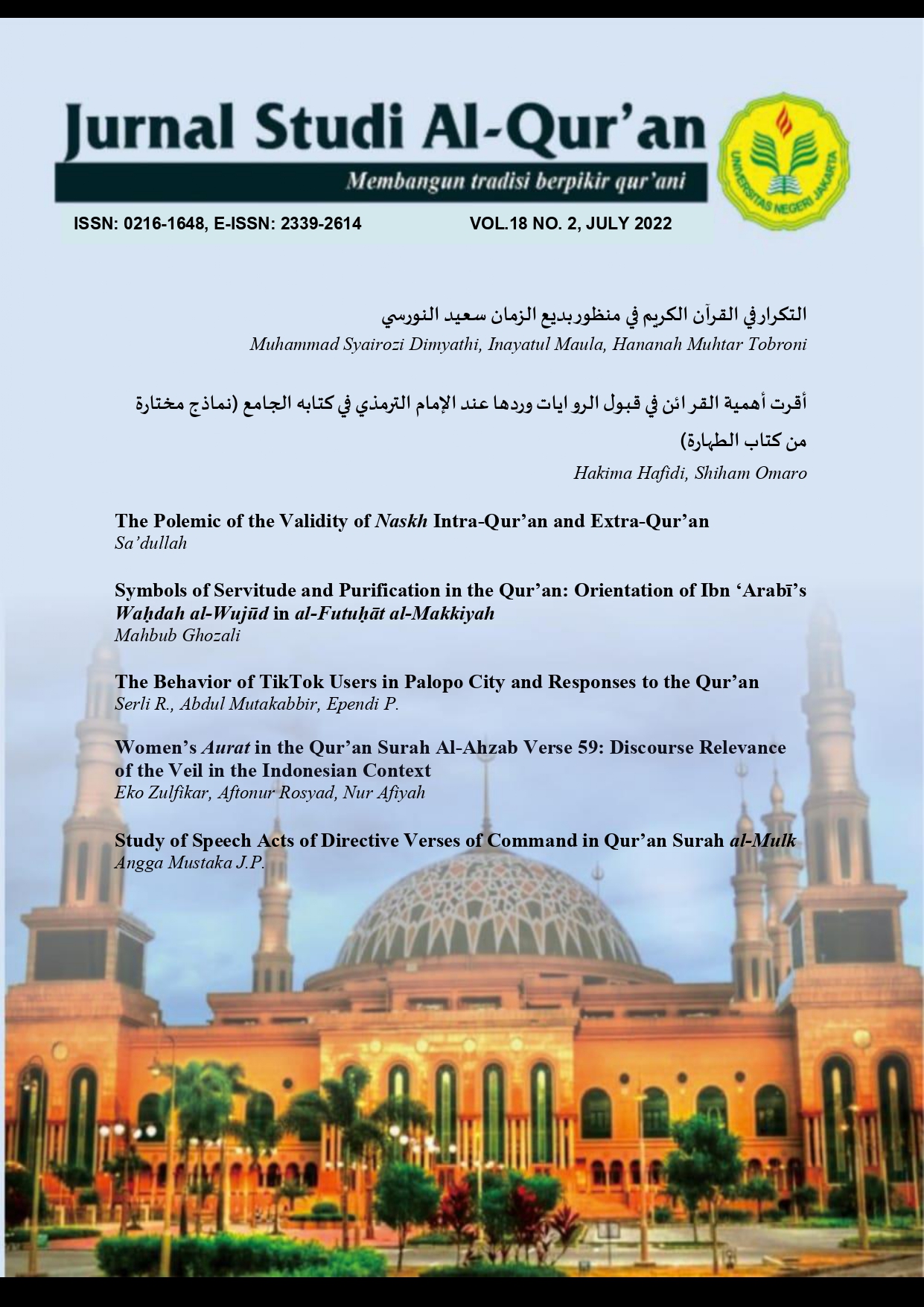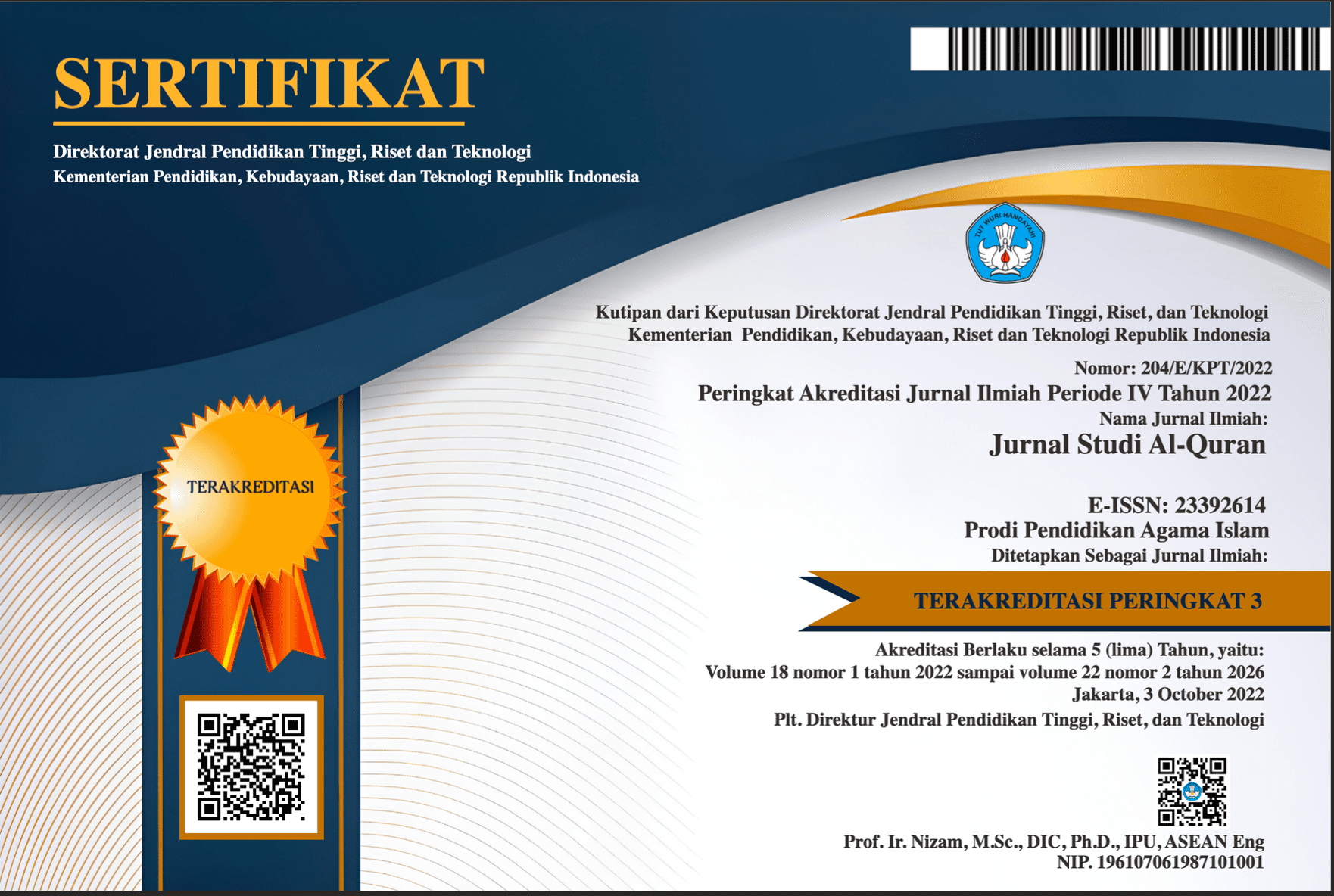The Behavior of Tik Tok Users in Palopo City and Responses to the Qur'an
DOI:
https://doi.org/10.21009/JSQ.018.2.05Keywords:
Behavior, Tiktok User, Palopo People, Response to the Qur’anAbstract
Tik Tok is a new platform that young people love, and kids are no exception. This platform encompasses all levels of society, including adults and even the elderly. TikTok has both positive and negative sides like any other medium. Therefore, this study aims to determine the understanding of the community, especially the people of Palopo, about the benefits of Tik Tok and how to use it. This research is a field study with the people of Palopo city as informants for interviews and documentation. As a result, Tik Tok is used more than a means of entertainment, which sometimes leads to verbal and physical disrespectful behaviour. Some opinions say that Tik Tok is an online media short video that shows recordings of dancing and showing TikTok-er's genitals. The people of Palopo city consider TikTokers more for entertainment filled with dancing. Therefore, it is necessary to limit access to various media, including TikTok, so as not to be carried away by immoral behaviour. Thus, the Qur'an is the key and a solution to protect yourself by not showing your aurat. It means that Tik Tok may dive without showing aurat and indulgence in lust. For further researchers, it is necessary to research the effects caused by the application and the solution before and after being exposed to the syndrome.
References
Aini, A. N., Effendi, M. R., & Nurjanah, E. (2021). Strategi Menanamkan Nilai-Nilai Akhlak Melalui Integrasi Pendidikan.
Akinbola, Bimbola. “#African Aunties: Performing Diasporic Digital Disbelongongings on TikTok.” Text and Performance Quartely (2022). https://www.tandfonline.com/doi/full/10.1080/10462937.2022.2044071?scroll=top&needAccess=true.
Al-Bukhari, Muhammad bin Ismail Abu ’Abdullah. Shahih Al-Bukhari. 1st ed. t.t.: Dar Thauq wa al-Najah, 2002.
Al-jauziyah, Ibn Qayyim. Memetik Manfaat Al-Qur’an, Terj. Jakarta: Cendekia Sentra Muslim, 2000.
al-Mahalli, Jalaluddin and Jalaluddin al-Suyuthi. Tafsir Jalalain. IV. Bandung: Sinar Baru Algesindo, 1997.
Al-Maraghi, Ahmad Mustafa. Tafsir Al-Maragi. 2nd ed. Semarang: CV. Toha Putra Semarang, 1992.
Andres Kaplan, Michael Haenlein. “User Of The World Unite The Challenges and Opportunities Of Sosial Media.” Business Horizons, 2010.
Arikunto, Suharsimi. Prosedur Penelitian. XV. Jakarta: PT. Rineke Cipta, 2013.
Ash-Shiddiqy, Muhammad Hasbi. Tafsir Al-Qur’an Majid. Semarang: Pustaka Rizki, 1995.
Demmy Deriyanto, Fathul Qorib. “Persepsi Mahasiswa Universitas Tribuana Tungga Dewi Malang Terhadap Penggunaan Aplikasi Tik Tok.” Jurnal Ilmu Sosial dan Ilmu Politik 7, no. 2 (2018): 78.
Dwi, Agia, Visi Utami, Suci Nujiana, Dasrun Hidayat, Universitas Adhirajasa, Reswara Sanjaya, and Universitas Subang. “Aplikasi Tiktok Menjadi Media Hiburan Bagi Masyarakat Dan Memunculkan Dampak Ditengah Pandemi Covid-19 Tiktok Application Becoming Entertainment Media For The Community And Increading Impact In The Middle Of Pandemic” 4, no. 1 (2021): 40–47.
Effendi, M. R., Kahmad, D., Solihin, M., & Wibisono, M. Y. (2021). Relasi Agama dan Masyarakat: Studi Tentang Interaksi Masyarakat Bandung Barat dan Jamaah Tabligh. Hayula: Indonesian Journal of Multidisciplinary Islamic Studies, 5(1), 1-24.
Effendi, M. R. (2021). TEOLOGI ISLAM Potret Sejarah dan Perkembangan Pemikiran Mazhab Kalam. Literasi Nusantara.
Effendi, M. R., Aulia, R. N., Darma, S. H., & Syahrezi, R. (2021). Integration of religious thought and student learning ethos in the covid-19 pandemic. ATTARBIYAH: Journal of Islamic Culture and Education, 6(2), 97-111.
Gemiharto, Trie Damayanti. Ilham. “Trie Damayanti. Ilham Gemiharto, Kajian Dampak Negatif Aplikasi Berbagi Video Bagi Anak-Anak Di Bawah Umur Di Indonesia.” Communication 10, no. 1 (2019).
Hakam, A., Anggraeni, D., & Fadhil, A. (2020). Pola dan Narasi Gerakan Keislaman di Universitas Negeri Jakarta. Hayula: Indonesian Journal of Multidisciplinary Islamic Studies, 4(2), 263-278.
Halim, A., Anggraeni, D., & Fadhil, A. (2021). Pembelajaran Al-Qur'an Berbasis Edutainment. Jurnal Studi Al-Qur'an, 17(1), 75-92.
Hasmira, Mira Hasti. Sosiologi Komunikasi. Padang: Universitas Negeri Padang, 2008.
Ismail, Y. (2019). Postmodernisme dan Perkembangan Pemikiran Islam Kontemporer. Jurnal Studi Al-Qur'an, 15(2), 235-248.
Kallang, Abdul. “Dunia Penuh Dengan Tipuan Telaah Atas Konsep Al-Gurur Dalam Al-Qur’an.” Jurnal IAIN Bone 10, no. 1 (2021): https://jurnal.iain-bone .ac.id/ index.php/annisa/.
Khalid, Amr. Akhlak Al-Mu’min, Terj. Sari Narulita Dkk.,. Jakarta: Qisthi Press, 2005.
Krutrök, Moa Eriksson, and Mathilda Åkerlund. “Through a White Lens : Black Victimhood , Visibility , and Whiteness in the Black Lives Matter Movement on TikTok.” Information, Communication & Society (2022): 1–19. https://doi.org/10.1080/1369118X.2022.2065211.
Kurniawan, Agwin Albert. “Nilai-Nilai Pendidikan Akhlak Dalam Kisah Nabi Hud Menurut Tafsir Fi Zhilali Qur’an Karya Sayyid Quthb.” Skripsi. Institut Agama Islam Negeri ponorogo, 2017.
Mansir, F., & Karim, A. (2020). Islamic education learning approaches in shaping students’ emotional intelligence in the digital age. Hayula: Indonesian Journal of Multidisciplinary Islamic Studies, 4(1), 67-86.
Marini, Riska. “Pengaruh Media Sosial TikTok Terhadap Prestasi Belajar Peserta Didik Di SMPN 1 Gunung Sugih Kab. Lampung Tengah.” Universitas Islam Raden Intan Lampung, 2019.
Muthahhari, Syahid. Membangun Generasi Qur’ani. Jakarta: Citra, 2012.
Narulita, S., Hyangsewu, P., & Diens, A. (2022). Moderate Muslim Characters in The Qur'an and Its Implementation in Islamic Religious Education Learning in Public Universities. Jurnal Studi Al-Qur'an, 18(1), 75-90.
Nasution. Metode Research. IV. Jakarta: PT. Bumi Aksara, 2001.
Pramudya, A. R., Anta, M. K., Taqiyya, H., & Effendi, M. R. (2021). The Religious Spirituality in a Time of Pandemic; Strategies for Strengthening Diversity in FIS UNJ Students. Muttaqien; Indonesian Journal of Multidiciplinary Islamic Studies, 2(2), 101-124.
Prianbodo, Bagus. “Pengaruh Tik Tok Terhadap Kreatifitas Remaja Surabaya.” Sekolah Tinggi Ilmu Komunikasi Almamater Wartawan Surabaya, 2018.
Purnamasari, M., & Thoriq, A. M. (2021). Peran Media dalam Pengembangan Dakwah Islam. Muttaqien; Indonesian Journal of Multidiciplinary Islamic Studies, 2(2), 87-99.
Qardhawi, Yusuf. Malamih Al-Mujtama’ Al-Muslim. 3rd ed. Solo: Era Intermedia, 2004.
Qorib, Demmy Deriyanto dan Fathul. “Persepsi Mahasiswa Universitas Tribuana Tungga Dewi Malang Terhadap Penggunaan Aplikasi Tik Tok,.” Jurnal Ilmu Sosial dan Ilmu Politik 7 7, no. 2 (2018): 79.
Rahmawati, S., Effendi, M. R., & Wulandari, D. (2022). Pengembangan Media Pembelajaran Berbasis Google Workspace Dengan Optimalisasi Akun Belajar. id. Paedagogie: Jurnal Pendidikan dan studi Islam, 3(01), 1-24.
Rofahan, Akhmad et. Al. Media Sosial: Masa Depan Media Komunikasi. I. Yogyakarta: Combine Resource Institution, 2014.
Rozak, Abdul. Akidah Akhlak. II. Bandung: Pustaka Setia, 2014.
Rusmanto, R., Syukri, A., & Hilmi, H. (2020). KONSEP AL-QUR'AN TENTANG KUALITAS HIDUP MANUSIA SEBAGAI SEORANG KHALIFAH DAN MASLAHATNYA TERHADAP MAKHLUK LAINNYA (Doctoral dissertation, UIN Sulthan Thaha Saifuddin Jambi).
Sabiq, Sayyid. Islam DIpandang Dari Segi Rohani Moral Sosial, Terj. Jakarta: Rineka Cipta, 1994.
Shihab, M. Quraish. Tafsir Al Misbah. III. Jakarta: Lantera Hati, 2005.
Siti Julaeha, E., & Ridwan Effendi, M. Karnafi.(2021). Everyone is Teacher Here Method and Its Effectiveness On Learning Outcomes of Akidah Akhlak. Muttaqien Publishing, 1(1), 91-104.
Subagyo, P. Joko. Metode Penelitian Dalam Teori Dan Praktek. III. Jakarta: PT. Rineke Cipta, 1999.
Wajdi, F. (2020). Literacy Culture in the Islamic Religious Education and the Development of Islam in Indonesia. Hayula: Indonesian Journal of Multidisciplinary Islamic Studies, 4(2), 171-188.
Wandi. “Social Media TikTok in Islamic Perspective.” Media and Islamic Communication 1, no. 1 (n.d.): https://scholar.google.co.id/scholar?hl=id&as_sdt=.
Zeng, Jing, and Crystal Abidin. “‘#OkBoomer, Time to Meet the Zoomers’: Studying the Memefication of Intergenerational Politics on TikTok.” Information Communication and Society 24, no. 16 (2021): 2459–2481. https://doi.org/10.1080/1369118X.2021.1961007.
Zuhaili, Wahbah. Tafsir Al-Wasith. Jakarta: Gema Insan, 2012.
Downloads
Published
How to Cite
Issue
Section
License
Authors who publish with this Journal agree to the following terms:
- Author retain copyright and grant the journal right of first publication with the work simultaneously licensed under a creative commons attribution licensethat allow others to share the work within an acknowledgement of the work’s authorship and initial publication of this journal.
- Authors are able to enter into separate, additional contractual arrangementfor the non-exclusive distribution of the journal’s published version of the work (e.g. acknowledgement of its initial publication in this journal).
- Authors are permitted and encouraged to post their work online(e.g. in institutional repositories or on their websites) prior to and during the submission process, as it can lead to productive exchanges, as well as earlier and greater citation of published works.
Users/public use of this website will be licensed to CC BY










